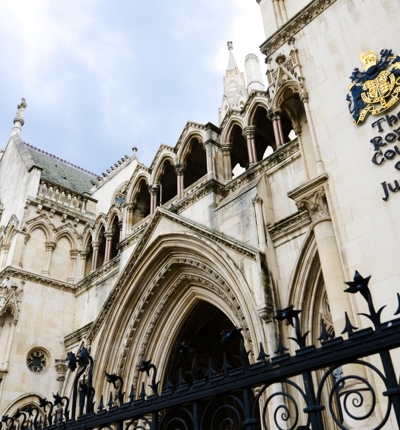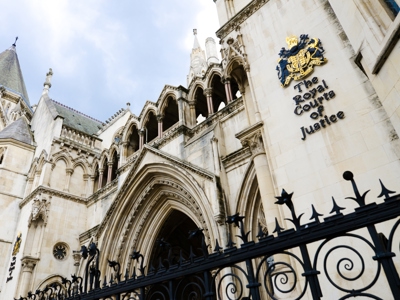
Climate campaigner to take Surrey oil wells dispute to Court of Appeal
A climate campaigner’s fight to prevent the development of oil wells in Surrey will go to the Court of Appeal.
Posted on 24 March 2021
Sarah Finch, of Redhill, Surrey, has been given permission to take her battle against Surrey County Council’s decision to grant Horse Hill Developments Ltd planning permission for the drilling and production of oil at a site in the Surrey Hills to the Court of Appeal.
Sarah will ask the Court of Appeal to consider whether the environmental impact assessment (EIA) used as part of the decision-making process should have considered the full climate impacts of the development, including greenhouse gas (GHG) emissions arising from the combustion of the oil produced at the site, in the context of the current climate emergency.
Although the first judge, Mr Justice Holgate, dismissed the challenge following a hearing in November, in granting permission to appeal, Lord Justice Lewison said that the EIA argument "has far reaching ramifications” and “the emission of GHG is a matter of considerable public concern". He added that "although the judge's reasons for his conclusion are cogent, they are open to proper challenge; and in view of the importance of the question, I regard this as a compelling reason for the appeal to be heard".
Friends of the Earth, who hope to be given permission to intervene in Sarah’s appeal against the ruling, believe that there are some parallels with the decision by Cumbria County Council to give the go ahead to a controversial coal mine. That decision has recently been called in for public inquiry by Communities Minister Robert Jenrick.
Sarah says the Surrey oils wells plan raises the same wider climate issues as the Cumbrian coal mine and matters hugely in light of the global climate summit COP 26 that will be hosted by the UK and held in Glasgow in November 2021.
Friends of the Earth made a submission to the High Court in support of Sarah’s case on why it was vital to assess the carbon impact of the oil produced by the proposed Surrey wells before any decision was taken to permit their development.
A key aspect of Sarah’s argument against the granting of permission for the oil wells has been the indirect GHG impact of the oil that will be produced. The Council’s decision permitted the large-scale production of hydrocarbons, predominantly oil for sale and use as fuel in transportation, beyond the year 2040. However, nowhere was there an assessment of the GHG emissions that will result from the use of that oil, which Sarah argues is a fundamental flaw in the EIA regime.
Sarah has been campaigning against the Horse Hill oil drilling operation since 2013. The proposed development is close to Gatwick Airport and six miles from Sarah’s home.
She has campaigned with others against the proposed expansion of the site, which over 20 years of oil production would include five drilling cellars, four hydrocarbon production wells, four gas-to-power generators, a process and storage area and tanker loading facility, seven oil tanks, each with a 1,300-barrel capacity and a 37-metre drill rig.
Sarah is represented by Leigh Day solicitors, Marc Willers QC (Garden Court Chambers) and Estelle Dehon (Cornerstone Chambers). Friends of the Earth is represented by Nina Pindham (No 5 Chambers) and Paul Brown QC (Landmark Chambers).
Sarah’s appeal will determine whether there was a failure to comply with the 2014 EIA Directive and the 2017 Town and Country Planning (EIA) Regulations, owing to the fact that the indirect GHG impacts of the development from burning oil were not assessed, on the grounds that the Judge: (i) too narrowly interpreted the scope of EIA as only including an assessment of the impact from the works permitted and not of the significant environmental effects of the whole development; and as a consequence (ii) wrongly held that the GHG emissions from the use of the oil were out of scope, notwithstanding that those emissions would happen elsewhere.
Sarah Finch said:
"I'm glad that the importance of this case has been recognised and we will now be able to put our arguments to the judges in the Appeal Court.
"The outcry earlier this year about the Government's refusal to intervene in the Cumbrian coal mine decision led to a change of heart. The Horse Hill oil case raises exactly the same issues – we can't go on extracting fossil fuels in a climate emergency.
"The UK will be a laughing stock at the global climate talks in Glasgow this year if projects like this are allowed to go ahead. If we want to be world leaders in avoiding dangerous climate change, we need to make sure our planning decisions are in line with our climate targets and that processes such as Environmental Impact Assessment are used to properly assess the full carbon impact of fossil fuel projects."
Katie de Kauwe, lawyer at Friends of the Earth, said:
“We maintain that Surrey County Council’s failure to consider the climate impact of burning the oil produced at Horse Hill was unlawful, so we’re delighted Sarah Finch has been given permission to continue this vitally important challenge in the courts.
“With the world staring at catastrophic climate change, and the UK committed to net zero, the full impacts of fossil fuel developments like this must be taken into account in the decision-making process.”
Rowan Smith, solicitor at Leigh Day, said:
“This appeal is hugely significant. It is the first time that an Appeal court in this country has grappled with whether the current law goes far enough to ensure that the carbon impact from domestic fossil fuel production is properly assessed. Whatever the outcome, the judgment will have major ramifications, not just for the local Surrey community, but also the UK’s entire approach to tackling the climate crisis.”

Human rights
If you believe your human rights have been denied, our team of human rights lawyers is one of the leading teams of practitioners in this specialist area in the country.



